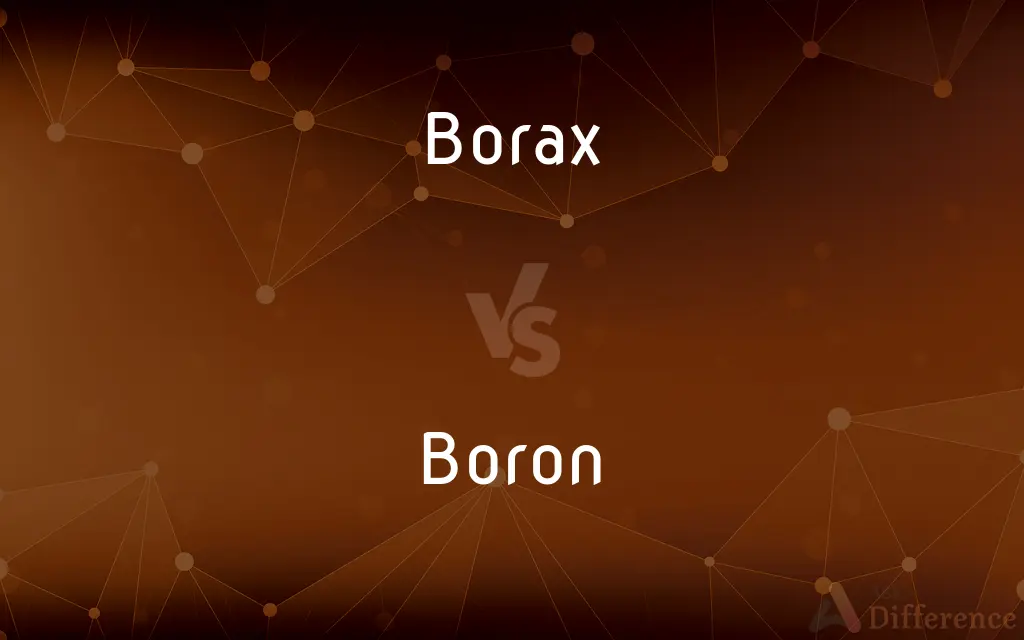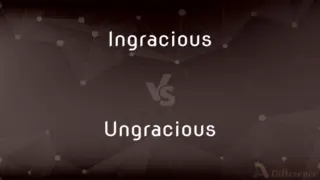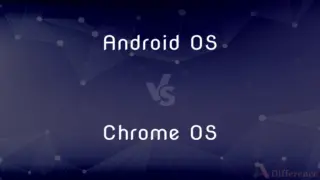Borax vs. Boron — What's the Difference?
By Tayyaba Rehman — Updated on July 20, 2023
Borax is a compound, sodium borate, used as a cleaning agent, while Boron is a chemical element (atomic number 5) essential for plant growth and used in various industries.

Difference Between Borax and Boron
Table of Contents
ADVERTISEMENT
Key Differences
Boron is a chemical element with the symbol B and atomic number 5, found naturally in the Earth's crust and in the solar system. On the other hand, borax is a compound derived from boron; its chemical name is sodium borate, and its formula is Na2B4O7·10H2O, indicating it includes boron, sodium, and water molecules.
Boron plays a critical role in plant growth and is utilized in the production of fiberglass and borosilicate glass. Borax, conversely, is used widely in various applications like detergents, cosmetics, glazes, and fire retardants, showcasing its versatility as a boron compound.
Boron is an essential human nutrient, beneficial in small amounts but harmful in large doses. Borax, while also featuring in some health supplements, can be harmful if ingested in large amounts or exposed to the skin and eyes, emphasizing the need for careful handling.
Boron is typically mined directly from the Earth as borate minerals, such as borax and kernite. Borax itself is obtained from these mined minerals through a refining process that involves repeated dissolving, filtering, and evaporation stages.
Boron appears as a brownish-black or silver-white metal, whereas borax often takes the form of colorless, white, or bluish-green crystals.
ADVERTISEMENT
Comparison Chart
Form
A natural mineral, typically found as evaporite deposits
A chemical element on the periodic table
Symbol
N/A
B
Atomic Number
N/A
5
Composition
Consists of boron, sodium, oxygen and water molecules
Pure element
Use
Commonly used in cleaning, laundry detergent, and ant control
Used in many compounds to make things like borosilicate glass, semiconductors, boron fibers, etc.
Toxicity
Borax is considered mildly toxic if ingested or inhaled in large quantities
Elemental boron is not toxic, but some boron compounds may be toxic depending on their form
Solubility
Soluble in water
Insoluble in water, but some boron compounds are soluble
Appearance
White crystalline solid
Black-brown solid
Chemical Formula
Na2B4O7.10H2O or sometimes written as Na2[B4O5(OH)4]·8H2O
B
Compare with Definitions
Borax
A white crystalline mineral used in cleaning products.
Laura added a tablespoon of borax to her laundry detergent to boost its cleaning power.
Boron
Boron is a chemical element with the symbol B and atomic number 5, found in nature primarily in compounds such as borax and boric acid.
Boron is used in the manufacturing of glass and ceramics because it modifies the structure of glass, making it more resistant to thermal shock and chemicals.
Borax
An alkaline mineral salt with properties that make it useful for neutralizing acidic substances.
The chemist used borax to balance the pH of the acidic solution during the experiment.
Boron
A neutron-absorbing element, making it useful in control rods in nuclear reactors.
Boron control rods are inserted or withdrawn from the reactor core to control the rate of the nuclear chain reaction.
Borax
Borax, also known as sodium borate, sodium tetraborate, or disodium tetraborate, is an important boron compound, a mineral, and a salt of boric acid. Powdered borax is white, consisting of soft colorless crystals that dissolve in water.
Boron
Boron is a chemical element with the symbol B and atomic number 5. In its crystalline form it is a brittle, dark, lustrous metalloid; in its amorphous form it is a brown powder.
Borax
A naturally occurring substance used for pest control.
To eliminate the ant colony, John sprinkled borax around the areas where he had noticed ant activity.
Boron
The chemical element (symbol B) with an atomic number of 5, which is a metalloid found in its pure form as a dark amorphous powder.
Borax
A hydrated sodium borate, Na2B4O7·10H2O, an ore of boron, that is used as a cleaning compound.
Boron
A single atom of this element.
Borax
A white or gray crystalline salt, with a slight alkaline taste, used as a flux, in soldering metals, making enamels, fixing colors on porcelain, and as a soap. It occurs native in certain mineral springs, and is made from the boric acid of hot springs in Tuscany. It was originally obtained from a lake in Thibet, and was sent to Europe under the name of tincal. Borax is a pyroborate or tetraborate of sodium, Na2B4O7.10H2O.
Boron
A nonmetallic element occurring abundantly in borax. It is reduced with difficulty to the free state, when it can be obtained in several different forms; viz., as a substance of a deep olive color, in a semimetallic form, and in colorless quadratic crystals similar to the diamond in hardness and other properties. It occurs in nature also in boracite, datolite, tourmaline, and some other minerals. Atomic number 5. Atomic weight 10.81. Symbol B.
Borax
A white compound which occurs as a mineral in some alkaline salt deposits and is used in making glass and ceramics, as a metallurgical flux, and as an antiseptic.
Boron
The chemical element of atomic number 5, a non-metallic solid.
Borax
Good-natured teasing or ridicule; banter.
They take a bit of borax, but that is part of the job.
Boron
A nonmetallic element that is amorphous and brown or crystalline and black, and is extracted chiefly from kernite and borax and used in flares, propellant mixtures, nuclear reactor control elements, abrasives, and hard metallic alloys. Atomic number 5; atomic weight 10.811; melting point 2,075°C; boiling point 4000°C; specific gravity (crystal) 2.34, (amorphous) 2.37; valence 3.
Borax
Cheap merchandise, especially tasteless furnishings.
Boron
A trivalent metalloid element; occurs both in a hard black crystal and in the form of a yellow or brown powder.
Borax
A white or gray/grey crystalline salt, with a slight alkaline taste, used as a flux, in soldering metals, making enamels, fixing colors on porcelain, and as a soap, etc.
Boron
Boron is a metalloid: a type of element that shares properties with both metals and nonmetals.
Boron's ability to conduct electricity, yet resist heat like a nonmetal, makes it a crucial component in semiconductors.
Borax
(chemistry) The sodium salt of boric acid, Na2B4O7, either anhydrous or with 5 or 10 molecules of water of crystallization; sodium tetraborate.
Boron
Boron is a trace mineral necessary for the growth and health of the human body, though required only in minute amounts.
Consuming boron-rich foods, such as almonds and avocados, can promote bone health and improve cognitive function.
Borax
Cheap or tawdry furniture or other works of industrial design.
Borax
(transitive) To treat with borax.
Borax
An ore of boron consisting of hydrated sodium borate; used as a flux or cleansing agent.
Borax
A traditional ingredient in the creation of homemade slime.
The kids mixed glue, water, and borax to make a fun and stretchy slime for their science project.
Common Curiosities
Is borax a source of boron?
Yes, borax is a source of boron. It is a boron compound that can be processed to extract pure boron.
Is boric the same as boron?
No, boric is not the same as boron. Boric refers to boric acid, a compound of boron, while boron is a pure element.
What's better than borax?
Some people prefer using washing soda or baking soda as a safer and more environmentally friendly alternative to borax, particularly for cleaning and laundry purposes.
What is the pH of borax?
Borax has a basic pH of about 9.3.
Is borax and boric same?
No, borax and boric are not the same. Borax is a boron compound, while boric refers to boric acid, another boron compound.
What is boron used for?
Boron is used in a variety of applications, including as an additive in fiberglass and ceramics, in laundry boosters, and in the production of borosilicate glass. It is also important for plant growth and is used in fertilizers.
What are the forms of borax?
Borax commonly comes in three forms: powder, crystal, and liquid.
What is another name for borax?
Borax is also known as sodium borate, sodium tetraborate, or disodium tetraborate.
What are functions of boron?
In plants, boron helps with cell wall formation and the absorption of calcium. In humans, it is believed to support bone health, brain function, and the immune system, though large amounts can be toxic.
What replaced borax?
Borax can be replaced by several products depending on the application, including baking soda, washing soda, or commercial cleaning agents.
What plant is high in boron?
Avocados, broccoli, prunes, and apples are examples of plants that are high in boron.
What ingredient is borax?
Borax is a compound of boron, sodium, and oxygen, and its chemical formula is Na2B4O7·10H2O.
Why is borax called Suhaga?
In India, borax is commonly known as "Suhaga." The term comes from the Hindi language, and it is widely used in traditional Indian medicines and remedies.
Can borax be used in food?
No, borax is not safe for consumption. It is used in some countries in food preparation, but its use is considered unsafe and is banned in many places.
Where is borax naturally found?
Borax is naturally found in evaporite deposits produced by the repeated evaporation of seasonal lakes.
Is borax powder harmful to humans?
Yes, borax powder can be harmful to humans if ingested or absorbed through the skin in large amounts.
What is the difference between boron and borate?
Boron is a pure element, while borate refers to any compound that contains the borate ion, which is a form of boron combined with oxygen and other elements.
What is the best source of boron?
Rasorite (kernite) and tincal (borax ore) are considered the best sources of boron.
What are common uses for boron?
Common uses for boron include its use in borosilicate glass, ceramics, detergents, and as an essential nutrient for plants.
What is the Indian name for borax?
The Indian name for borax is "Suhaga."
Is baking soda same as borax?
No, baking soda and borax are not the same. Baking soda is sodium bicarbonate, while borax is sodium borate.
Why should I use borax?
Borax can be used for a variety of purposes, including cleaning, deodorizing, pest control, and pH balancing.
What is borax called in Pakistan?
In Pakistan, borax is commonly known as "Suhaga."
Is borax all natural?
Yes, borax is a natural mineral that is mined from the earth.
Can humans touch borax?
Yes, humans can touch borax, but it can cause skin irritation, so it's recommended to use gloves while handling it.
Is borax just salt?
No, borax is not just salt. It is a boron compound, while salt typically refers to sodium chloride.
Is borax safe to use on skin?
Borax can cause skin irritation and should not be used directly on the skin.
Which foods contain borax?
Some processed foods, particularly in Asia, may contain borax, though its use in food is banned in many places due to health concerns.
Is borax FDA approved?
No, borax is not FDA-approved for use in food or cosmetics.
Is borax a preservative?
Yes, borax can be used as a preservative, though its use in food and cosmetics is restricted in many places due to health concerns.
What is the price of 1kg borax powder?
The price of 1kg of borax powder varies widely depending on the location and the supplier.
Why is borax banned in other countries?
Borax is banned in some countries due to health concerns. It can be toxic if ingested or absorbed through the skin in large amounts.
Can I mix borax with vinegar?
Yes, borax can be mixed with vinegar. The mixture is often used for cleaning purposes.
Which country is rich in boron?
Turkey has the world's largest boron reserves, followed by the United States.
How many types of boron are there?
There are two isotopes of boron that occur naturally: boron-10 and boron-11.
How is boron made naturally?
Boron is not made but is found naturally in the earth's crust. It is often mined in the form of compounds like borax and kernite.
What is boron used for daily?
In our daily lives, boron is used in detergents, cosmetics, agricultural fertilizers, and in the glass of smartphones, TVs, and other devices.
What is the main use of boron?
The main use of boron is in creating strong, heat-resistant glass, such as borosilicate glass, which is used in cookware and laboratory equipment.
What is special about boron?
Boron is a versatile element that is essential for plant growth and is also used in many industrial applications. It is also unique in that it is a metalloid, meaning it has properties of both metals and non-metals.
What are common uses of boron?
Common uses of boron include in glass and ceramics, detergents, and fertilizers, as well as in some fire retardants and as an insecticide.
Is borax an insecticide?
Yes, borax can be used as a natural insecticide. It kills insects by dehydrating them and disrupting their digestive system.
Share Your Discovery

Previous Comparison
Rebuttal vs. Surrebuttal
Next Comparison
Ingracious vs. UngraciousAuthor Spotlight
Written by
Tayyaba RehmanTayyaba Rehman is a distinguished writer, currently serving as a primary contributor to askdifference.com. As a researcher in semantics and etymology, Tayyaba's passion for the complexity of languages and their distinctions has found a perfect home on the platform. Tayyaba delves into the intricacies of language, distinguishing between commonly confused words and phrases, thereby providing clarity for readers worldwide.















































